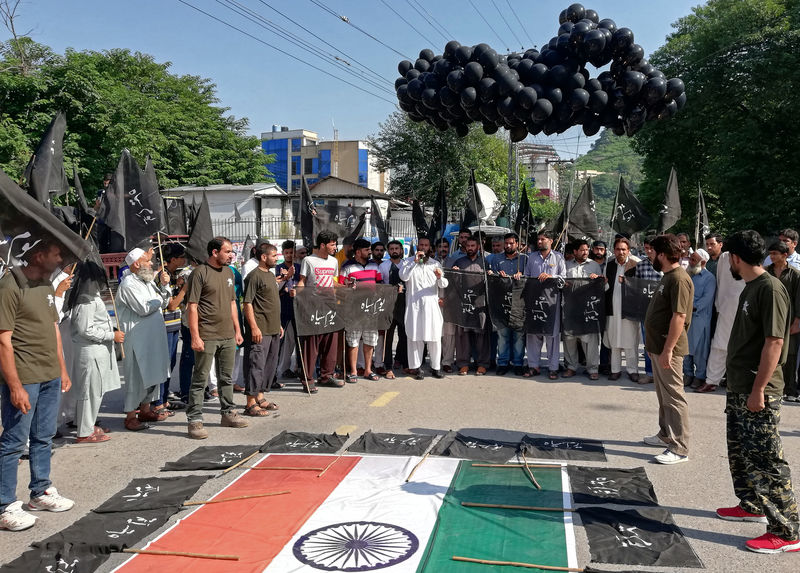By Abu Arqam Naqash and Alasdair Pal
MUZAFFARABAD/ISLAMABAD (Reuters) - Pakistan observed a 'Black Day' on Thursday to coincide with India's Independence Day celebrations, as one of the main militant groups fighting Indian rule in Kashmir led a protest through Pakistan's part of the disputed region.
India's decision this month to revoke special status for its portion of Kashmir, along with a communications blackout and curbs on movement, caused fury in Pakistan, which cut trade and transport links and expelled India's envoy in retaliation.
Supporters of the Hizbul Mujahideen militant group were among more than 1,000 people who marched through Muzaffarabad, capital of Pakistan's region of Azad Kashmir, holding black flags and shouting anti-India slogans.
"As long as India continues its occupation of Kashmir, we will fight within the occupied territory, with full force," Hizbul Mujahideen's deputy commander, Saifullah Khalid, told the crowd.
"Until the eviction of the last Indian soldier, our armed struggle will go on."
India has banned Hizbul Mujahideen as a terrorist outfit, which it has long said Pakistan funds, along with similar groups. Islamabad denies this, though it does not ban the group.
Newspaper issues carried black borders and politicians, including Prime Minister Imran Khan, replaced their social media pictures with black squares. Flags on government buildings flew at half-mast.
Pakistan's largely symbolic 'Black Day' comes amid growing frustration in Islamabad at the lack of international response over the Kashmir dispute.
Pakistan was isolated diplomatically and faced "a world in denial" over the situation in Kashmir, Dawn, the country's most influential English-language newspaper, said in an editorial.
The 15-member United Nations Security Council could discuss the dispute as soon as Thursday, but Pakistan says it only has guaranteed support from China, which also claims part of India's Jammu and Kashmir state.
Permanent security council member Russia said on Wednesday it supported India's stance that the dispute should be resolved through bilateral means, while the United States has called India's decision an internal matter for New Delhi.
In his Independence Day speech in the Indian capital, Prime Minister Narendra Modi highlighted the decision to strip the Muslim-majority region of its special rights among the bold moves of his second term, following an election victory in May.

"Today every Indian can proudly say 'One Nation, One Constitution'," Modi, speaking from the ramparts of the historic Red Fort, said of the decision.